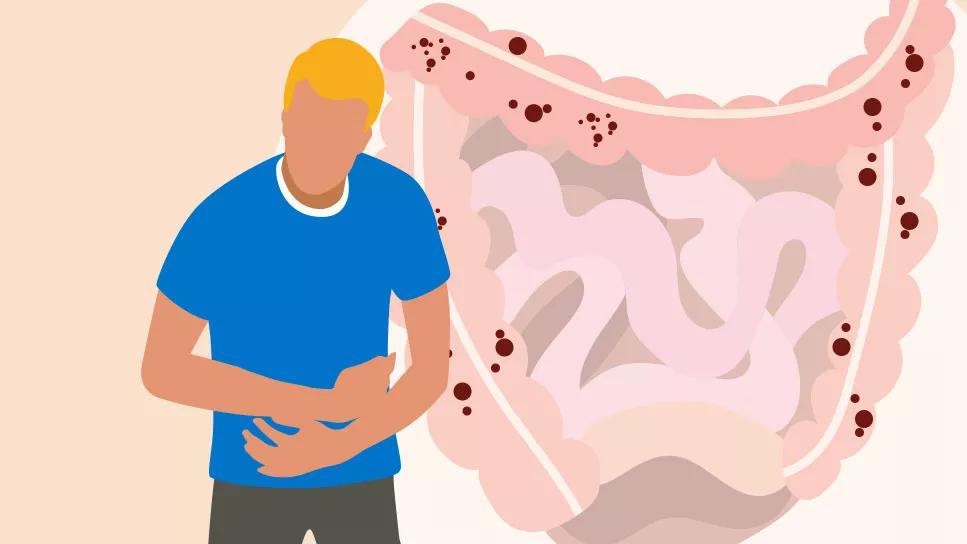If you have IBD, there are roughly nine food types that might contribute to inflammation flare-ups

If you have an inflammatory bowel disease (IBD), you know how awful a flare-up can be. And no matter what you do, the inflammation that comes with conditions like Crohn’s disease and ulcerative colitis might feel like an unavoidable consequence. Stomach pain, cramping and diarrhea can make you feel miserable and put a damper on your plans. And you’re left wondering, what, if anything, can turn the tide on your chronic symptoms?
Advertisement
Cleveland Clinic is a non-profit academic medical center. Advertising on our site helps support our mission. We do not endorse non-Cleveland Clinic products or services. Policy
Ulcerative colitis causes localized inflammation in your colon (large intestine) and rectum. Crohn’s disease can cause inflammation anywhere in your gastrointestinal tract — from your mouth all the way to your anus. And both, believe it or not, can be made worse if you’re triggered by certain kinds of foods, says registered dietitian Kendra Weekley, RD, LD.
“There’s not a specific diet for Crohn’s disease or ulcerative colitis,” she says. “But foods that can be totally fine for one person might be a problem for others.”
Although there isn’t much research about an ulcerative colitis diet or a Crohn’s disease nutritional plan, there are some usual suspects you might want to avoid when your gut is giving you grief.
Weekley emphasizes that you shouldn’t try to manage either of these diseases with food alone.
“Inflammatory bowel diseases aren’t something you can cure with diet — you need to have a healthcare team treating these,” she says. “But if you’re having a flare-up, these are some foods you might want to avoid or limit to lessen the severity and frequency of your symptoms.”
Remember: Trigger foods are different for everyone. So, if you’re unsure where to start, talk to a healthcare provider before you begin cutting out the following foods:
Advertisement
High amounts of fiber can cause a lot of traffic in your gastrointestinal tract, including:
“These foods can be irritating to someone experiencing a disease flare,” says Weekley.
Beans are a wonderfully nutritious food — when you’re feeling good, Weekley notes. But during a flare, their high fiber content and tendency to cause gas is a lose-lose situation that can make you feel bloated with pain.
“Some people think they can’t eat vegetables with IBD, and that’s not true,” Weekley says. “But you do have to be careful during a flare.”
Avoid fruits and vegetables with skins and seeds intact. Instead, aim for cooked veggies rather than raw to avoid irritating your gut. Blended fruits in a smoothie can also be a great way to get a variety of fruits in your diet during a flare-up.
Many people find that bananas or canned pears are gentler than an apple or bowl of raspberries, for instance. Also, steer clear of other gassy veggies like broccoli, cabbage and Brussels sprouts. “They’re high in fiber and gas-producing — kind of a double whammy,” Weekley says.
Nuts and seeds can be rough — literally. Their sharp edges can be irritating to the lining of your gastrointestinal (GI) tract. “But people often tolerate ground nuts or seeds,” Weekley notes, so consider giving smooth peanut butter, almond butter or sesame tahini a try.
Alcohol can be irritating to anyone’s GI tract, especially people who are already experiencing stomach symptoms. That goes for all types of alcoholic beverages.
“Beer, wine and liquor are not great choices if you’re having symptoms,” warns Weekley.
Caffeinated beverages can also be a problem. “Caffeine increases the wave-like motion of the GI tract, which is what propels waste through the system,” she explains. “If you tend to have diarrhea with your Crohn’s flare, caffeine may make your symptoms worse.”
Sugary drinks like soda, fruit juice and lemonade can also cause more diarrhea when you’re having a flare-up. So-called “sugar alcohols” are also a problem.
These are sweeteners used in sugarless gum, candy and some drinks. They go by names like xylitol, sorbitol and maltitol, which are listed on the nutrition facts label.
“In many people, these ingredients are poorly absorbed, which can cause gas, bloating and diarrhea,” Weekley says.
Contrary to popular belief, many people with Crohn’s can actually consume dairy products without grief, Weekley clarifies. But when you have symptoms, whole-fat dairy products (like whole milk, ice cream and sour cream) can be a problem, so step away from the fettuccini alfredo.
Advertisement
“Lactose-free dairy might also be better tolerated when you are experiencing a flare. For example, lactose-free milk, yogurt and low-lactose cheeses like Swiss, feta, Parmesan or cheddar are typically well-tolerated,” she adds.
Odds are, you won’t be tempted to reach for the hot sauce if you’re having IBD symptoms.
“Most people who have a flare aren’t eating spicy chili or burritos,” Weekley says.
Trust that instinct. Spices like chili powder, cayenne pepper and spicy curries can add heat to an on-fire GI tract.
“It’s hard for your body to deal with the amount of fat in fast food and other greasy, fatty foods like sausage or salami,” Weekley says. And when food is difficult to break down, it puts unnecessary pressure on an already stressed-out GI tract. So, maybe next time you’re considering a drive-thru, go for some lean grilled chicken instead.
You might need to do some sleuthing to figure out what works (and doesn’t work) for you. Try keeping a food journal — jotting down what you ate and any symptoms you notice — to look for clues about the foods that make your stomach unhappy. And if you’re caught up in a flare-up, don’t put all food on hold. Try eating some of the following to give yourself the nutrition you need without causing further distress to your gut:
Advertisement
But when you aren’t having symptoms, try to eat a balanced diet. You don’t want to regularly shun foods like whole grains, veggies or beans. “Malnutrition can be a problem for people with IBD, so only avoid certain foods during a flare-up if those foods cause an onset of symptoms,” says Weekley.
Managing this lifelong disease can be a challenge, but a dietitian can help you manage your nutritional goals every step of the way.
“Crohn’s is different for every person, so work with someone who can help you design an individualized plan,” Weekley advises. “If you have a dietitian in your corner, they’ll be available so that when you have a problem, they can steer you in the right direction.”
Advertisement
Learn more about our editorial process.
Advertisement

Studies show a strong self-care regimen can improve symptoms and overall health

The caffeine and natural acids in coffee may trigger acid reflux, but there are ways to lessen the effects

Olive oil is high in heart-friendly unsaturated fats

The tropical fruit is a good source of antioxidants and vitamin C

Alternating between periods of eating and fasting may benefit your health

High amounts of cholesterol and saturated fat in red meat may be linked to heart disease

This plant-based eating plan focuses on lowering cholesterol, making it a great companion to the Mediterranean diet

Research consistently shows that soy-based foods do not increase your risk of breast cancer

Wearing a scarf, adjusting your outdoor activities and following your asthma treatment plan can help limit breathing problems

Your diet in the weeks, days and hours ahead of your race can power you to the finish line

When someone guilt trips you, they’re using emotionally manipulative behavior to try to get you to act a certain way